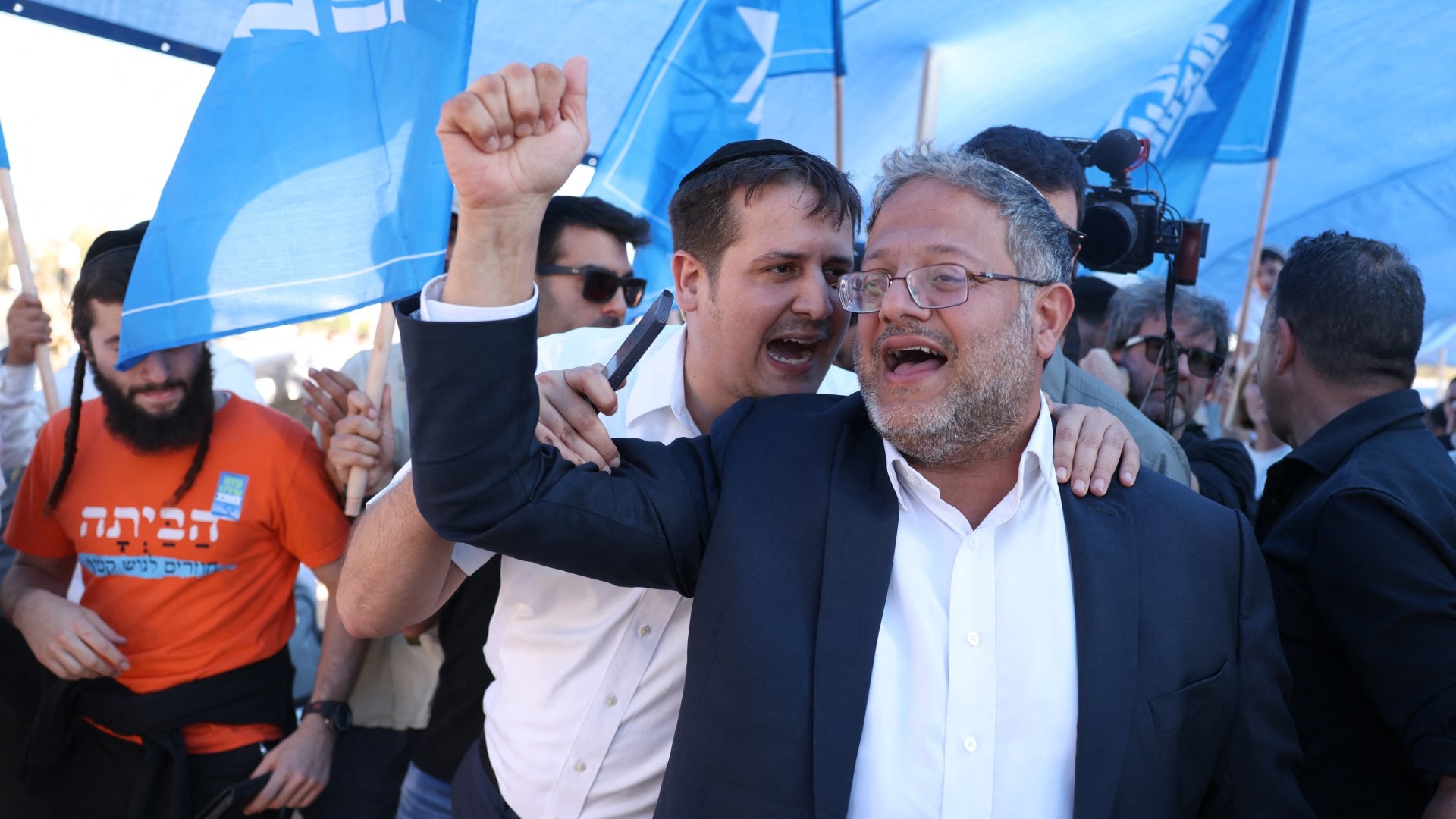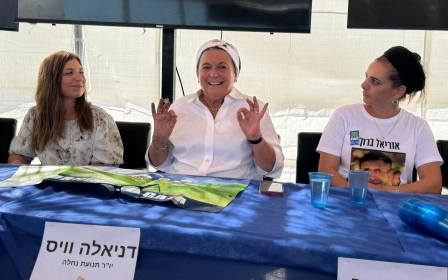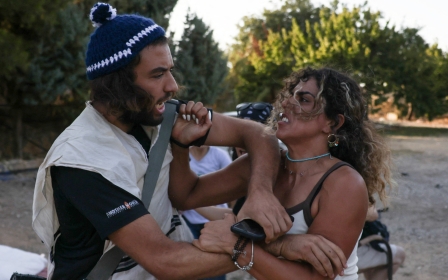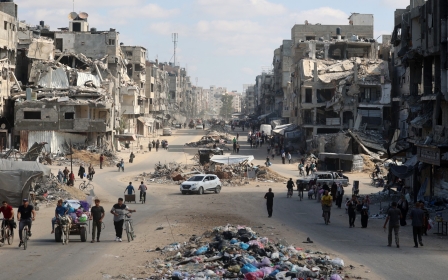As Gaza burns, Israeli settlers make 'real estate' plans

US Secretary of State Antony Blinken flew into Israel on Tuesday pressing for a ceasefire in Gaza following the killing of Hamas leader Yahya Sinwar.
But a ceasefire was the last thing on the mind of the Knesset members, government ministers and hundreds of Israeli settlers who convened a day earlier to plan the future of the enclave.
These plans did not include any kind of negotiation. There was one subject under discussion at the conference, timed to coincide with the annual Sukkot religious holiday which marks the exodus of the Jews from Egypt.
Israel's settlement of Gaza.
The event, organised by the settler organisation Nahala, was held just three kilometres from the Gaza frontier.
New MEE newsletter: Jerusalem Dispatch
Sign up to get the latest insights and analysis on Israel-Palestine, alongside Turkey Unpacked and other MEE newsletters
Significantly it was in a closed military zone, and this conference was held under army protection.
The regular thud of outgoing artillery fire interrupted speeches, and was greeted by applause and cries of, "God bless our brave soldiers.”
Many of the men present carried machine guns or pistols.
“In the event of a terrorist infiltration,” boomed the PA announcer, “we ask you please not to fire your weapon. Let the security handle it. This is for everyone’s safety.”
Those present at the conference included supporters from the United States, South Africa and Australia.
One great grandmother from Melbourne wore a sticker saying in Hebrew that “Gaza is part of Israel” and on the other “Kahane was right”.
A number of those at the conference carried stickers celebrating Meir Kahane, the late American-born rabbi and convicted terrorist who advocated that Palestinians should be forced out of Israel.
Nahala leader Daniella Weiss, one of the heroes of the conference, boasted that families were ready to move to the edge of the Gaza border, claiming that Nahala had already entered a deal worth “millions of dollars” for temporary housing units as a preliminary to settlement of the Strip.
She predicted: “You will witness how Jews go to Gaza and Arabs disappear from Gaza.”
Gaza seafront 'a bargain'
Which would be excellent business for Or Yomtovyan, an activist for Israeli security minister Itamar Ben Gvir’s far-right Jewish Power party.
Yomtovyan is in the property business. Speaking outside the Jewish Power sukkot (tent) he told MEE that settling Gaza would be “a good solution for the real estate problem. We are a small country and there’s big land here we can use.”
Asked when Gaza could be occupied, he replied: “First things first. As soon as possible.”
Asked by MEE how much seafront property in Gaza might be worth, he replied “it will be a bargain. Properties in Tel Aviv next to the sea cost 20-50 million shekels [$5m-$13m]. Here we can sell cheap.”
Yomtovyan said he was 16th on Jewish Power’s parliamentary candidates list, and predicted that its leader, Ben Gvir, would be Israel’s next prime minister after Netanyahu.
It would be a serious error to dismiss the conference as a fringe event reflecting the wild fantasies of Israel’s settler movement. Big money and top politicians have a stake in the future of Gaza.
The event was attended by senior government ministers and Knesset members, including several from Netanyahu’s Likud party.
Finance minister Bezalel Smotrich, who is also in charge of civil administration in the West Bank and has called for Israel to annex the occupied Palestinian territory, was there.
But Ben Gvir was the star of the show, joining in communal dancing and hailed by many others present as the next prime minister.
Ben Gvir maintained that Hamas-led attacks in southern Israel on 7 October last year, in which about 1,200 Israelis were killed and hundreds more taken hostage, had changed the mindset of Israelis.
“We are the owners of this land,” he said. “They understand that when Israel acts like the rightful owners of this land, that is what brings results.”
He told his audience that Israel would encourage what he called the “voluntary transfer of all Gazan citizens”, adding “We will offer them the opportunity to move to other countries because that land belongs to us”.
Ben Gvir and Smotrich are senior members of the Likud-led coalition that governs Israel.
And recent history shows that these two settler leaders get what they want.
This is partly a result of growing popular support, but above all because Netanyahu’s government would fall without them. Ben Gvir’s vision of a Palestinian-free Gaza is backed by raw power.
Nahala leader Daniella Weiss alluded to this new settler power when she referenced Netanyahu’s statement earlier this year that the idea of Gaza settlement was “unrealistic”.
She pointed out that many had made the same observation of the West Bank, which is today overrun by Israeli settlers.
“We have the political support, the public support and the experience of 55 years of settling Judea [and] Samaria [the occupied West Bank] and the Golan Heights. More than 330 settlements. We have accumulated a lot of experience to do this politically.”
As far as she is concerned, the Palestinians must leave Gaza. She told a crowd of international journalists that they should go “to England, to Africa, to Turkey. Just as people of Afghanistan moved during the war, such as people of Syria, such as people from Ukraine.”
The Palestinians, emphasised Weiss “will not stay in Gaza by no means”.
'No mercy'
Likud MPs supported much of what Weiss had to say.
Knesset member Ariel Kallner told MEE there should be “settlements in North Gaza and strategic places like the Philadelphi corridor [a strip of land along Gaza’s southern border with Egypt]”, adding that many members of Likud supported the plan.
He told MEE that Gaza “made this massacre when receiving so many privileges they never had before.
“We need to understand what is radical Islam, what is the Palestinian Authority. They supported October 7th. They support terrorists. We need the world to understand such regimes should be eliminated. The civilisation should understand that these barbarian regimes and ideologies are enemies of civilisation.”
Asked what he thought about the so-called “Generals’ Plan” currently in operation in north Gaza, which many see as a strategy of ethnic cleansing to drive Palestinians out of the territory or kill those who stay, Kallner said it was “a very, very reasonable plan”.
“There are also other plans to eliminate the evil Hamas regime,” he added, stressing the need to weaken Hamas by taking control of humanitarian aid.
Another Likud Knesset member, Tally Gotliv, also threw her weight behind Gaza settlements, telling MEE: “I made it clear from the first day of the war that one of our goals should be the occupation of north Gaza.”
When asked by MEE whether Netanyahu supported the plan, Gotliv replied: “I have no doubt that he is supporting the settlement of Gaza because it will bring more security not just for the area around Gaza Strip but for Israel.“
MEE asked her what should happen to Gaza residents.
“The people in the north of Gaza allowed the Hamas fighters to go through on October 7th,” she said.
“I have no mercy. The only mercy we have is that we give them the chance to leave… They should leave and go to the south.”
The settlers did not have it all their own way. As we arrived in the car park, a number of Israelis waving yellow flags in protest against the conference had gathered to read out the names of the hostages and accuse the organisers of sacrificing their lives in pursuit of war in Gaza.
On the way to the conference, we drove through areas that had been devastated on 7 October last year.
The event gained extra symbolic significance because last year the Sukkot thanksgiving celebration coincided with the Hamas-led attacks.
We passed close to the Be’eri Kibbutz, where 101 civilians and 31 security personnel were killed. At several points, pilgrims come to pay tribute to the victims.
In the distance smoke billowed from the Jabalia refugee camp, currently under attack by an Israeli tank assault and air strikes which have killed dozens of people in recent days, according to the Palestinian health ministry.
Israelis had parked their cars at one vantage point to watch as Gaza continued to burn.
Middle East Eye delivers independent and unrivalled coverage and analysis of the Middle East, North Africa and beyond. To learn more about republishing this content and the associated fees, please fill out this form. More about MEE can be found here.




